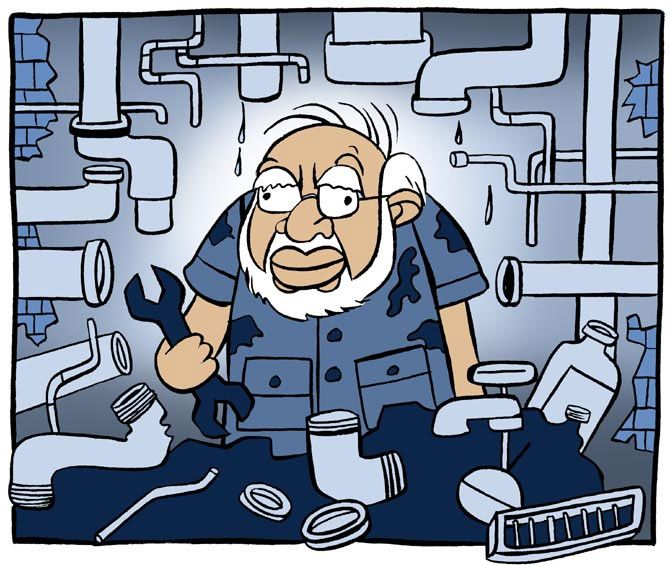Senior bureaucrats say the government has planned a 'feel-good' Budget after the 'pain' of demonetisation.
Arup Roychoudhury and Archis Mohan report.
Illustration: Uttam Ghosh/Rediff.com
 The Narendra Modi government and the Bharatiya Janata Party have planned a blitzkrieg of initiatives to recast the political narrative at the expiry of the '50 days of pain' because of the note ban, particularly before the assembly polls in five states, including Uttar Pradesh.
The Narendra Modi government and the Bharatiya Janata Party have planned a blitzkrieg of initiatives to recast the political narrative at the expiry of the '50 days of pain' because of the note ban, particularly before the assembly polls in five states, including Uttar Pradesh.
Senior BJP leaders and ministers claim Modi's rally on January 2 in Lucknow is set to be a game-changer in the note ban discourse.
This would also be an opportunity for the Modi government to announce such measures before the Election Commission of India's Model Code of Conduct kicks in after the announcement of poll dates for five states, likely in the first week of January.
According to sources, the PM could announce a number of relief measures for the rural population, agrarian sector, and small and medium enterprises ahead of the Union Budget 2017-2018.
The Budget, likely to be presented by Finance Minister Arun Jaitley on February 1, is expected to announce income tax relief for professionals and greater outlay for primary education and health.
While the Opposition parties are likely to cry foul at the budgetary announcements as a violation of the model code, finance ministry sources said the Budget was a Constitutional exercise and didn't come under the purview of the code.
The 2012-2013 Budget was postponed in view of the elections in five states -- Manipur, Goa, Uttarakhand, Punjab and Uttar Pradesh.
The elections were held in February-March and the Budget session of Parliament, which usually begins in the last week of February, began on March 12 after the polls.
The PM and senior BJP leaders like party chief Amit Shah and Finance Minister Arun Jaitley will also get an opportunity to reach out to party cadres at the BJP National Executive in the national capital.
Another Mody rally is likely in Delhi on January 6 and 7.
Party sources, however, said the national executive will be devoted to strategising about how the government's message should reach the public at large.
Since Monday, december 19, the government has made efforts to reach out to the BJP's traditional and new support base, comprising traders and farmers.
The government announced a 2% rebate for small traders and businesses accepting digital payments.
It also instructed the Income Tax Department not to harass small traders for bank deposits below a certain threshold.
On Tuesday, the government gave 60 more days to farmers for loan repayments.
Apart from the PM's announcements, the Budget could provide substantially higher allocations for rural-focused schemes, infrastructure, health care and job creation.
Senior bureaucrats say the government has planned a 'feel-good' Budget after the 'pain' of demonetisation.
According to a source in the human resource development ministry, since the PM has taken the ownership of the note ban decision, he is likely to announce the 'gains' himself.
"We believe this phase of economic slowdown will last barely two to three quarters. We have the political resilience to withstand this period. Once the economy starts improving, the gains will show," BJP National Secretary Sidharth Nath Singh said, pointing at the BJP's victory in the civic polls, including Chandigarh, on Tuesday, as evidence that the people were with the PM.
Singh said economists who criticised the note ban were losing sight of the long-term economic gains from the decision, particularly a wider indirect and direct tax base and lesser printing of currency notes in the future.
Senior BJP leaders estimated the economy would not only recover but also start growing by 7% to 8% by mid-to-end 2018, a healthy situation for the Modi government to go into the 2019 Lok Sabha elections.
When asked if a number of sops could be announced before February 1, the expected Budget day, an official, aware of the Budget preparations, said: "There is no rule which stops the government to announce measures outside the Budget. The Budget is a fiscal document which presents the Centre's expected revenue and expenditure."
"It is up to the political leadership to decide which announcements will be made in the Budget and which will be made outside of it."
Economists tell govt to increase spending
They told Finance Minister Arun Jaitley to present an 'out of the box' Budget, ensuring focus on heathcare, job creation and infrastructure.
Arup Roychoudhury reports.
Economists and experts told Finance Minister Arun Jaitley, in pre-Budget consultations on Tuesday, to present an 'out of the box' Budget, ensuring focus on heathcare, job creation and infrastructure.
Those present at the meeting were National Institute of Public Finance and Policy Director Rathin Roy, Indian Institute of Management, Ahmedabad Professor Ravindra Dholakia, Nomura Executive Director Sonal Verma, State Bank of India Chief Economic Advisor Soumya Kanti Ghosh, Ajit Ranade, Surjit Bhalla and others.
They also advised the government that the Budget should carry forward the work done through demonetisation and push for greater digitisation in the economy.
The economists also told the government that the Budget should have a detailed list of the costs of demonetisation on all related activities such as printing of new notes, etc.
While demonetisation could check black money for the moment, tey added it would not be able to stop the generation of black money in the future.
A finance ministry statement said, 'So the next task should be to stop generation of black money in the future. For this, the government should incentivise people to move from the informal to the formal system and maximise the use of e-payments.'
'Some members felt that even after demonetisation, there is a strong case for boosting capital expenditure as public infrastructure in India is too low,' added the statement.
People aware of the discussions in the meeting, the economists also advised the FM to stop worrying about fiscal deficit targets and focus on increasing capital expenditure and social sector spending.
Despite years of effort to rein in fiscal deficit, they added the rating agencies the ratings agencies had not upgraded its long-term sovereign ratings.
In such a scenario, and at a time when major developed and developing economies were increasing federal spending, India should do the same.
The focus of the Centre's spending, said economists, should be on infrastructure, job creation, and the social sector.
With private sector balance sheets still weak, the government would not only have to maintain its public spending spree, but maybe even increase it.
The fiscal deficit target for the financial year 2016-2017 is at 3.5%. Jaitley is likely to meet that target, thanks mostly to encouraging trends in direct and indirect taxes.
The fiscal deficit for the coming years will be based on what the Fiscal Responsibility and Budget Management committee recommends to the government.












 © 2025
© 2025